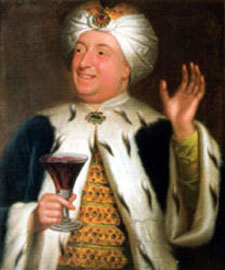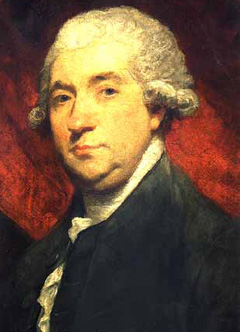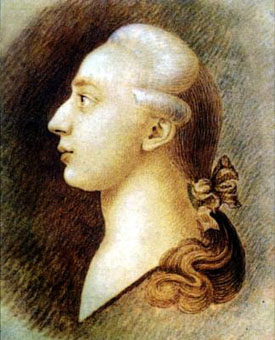I'm aware that I haven't exactly depicted these rakes in a romantic light, but if one man's outrageous behaviour has particularly amused you, then please vote for him on the right-hand sidebar and/or post some comments - I'd love to hear what you think! And check back for info on the rakes' progress - I'll post an article on the winning libertine in due course.
 Sir Francis Dashwood (1708-81)
Sir Francis Dashwood (1708-81)Rake, profligate and chancellor of the exchequer (1761-3), Dashwood is perhaps best known as the founder of the Hell-Fire Club and the Society of Dilettanti. Horace Walpole described the latter as ‘a club of which the nominal qualification is having been to Italy, and the real one of being drunk’. Dashwood conceived the idea for the Hell-Fire Club while at a service at the Sistine Chapel, during which worshippers pretended to scourge themselves with whips. Unsatisfied with this pretence, he returned later with a horsewhip and thrashed the congregation soundly. He was thrown out of Italy for ‘scandalous behaviour’.
 James Boswell (1740-1795)
James Boswell (1740-1795)The diarist and biographer of Johnson had a lecherous eye for the ladies, not to mention a penchant for ‘old hock’ and rude drinking songs. Young, restless and spurned by an actress, he decided to leave Glasgow for London in order to become a Roman Catholic priest. No sooner had he arrived than he was seeking out the ‘melting and transporting rites of love’ courtesy of girls in the Strand. While detailing his philanderings with an actress in his
London Journal, he boasted: ‘Proud of my godlike vigour, I soon resumed the noble game… [Louisa] declared I was a prodigy.’ His feelings cooled when he realised she had given him the pox.
 Giacomo Casanova (1725-1798)
Giacomo Casanova (1725-1798)Silver-tongued Casanova understood and loved women, though he was not above bribing them: ‘There exists no honest woman with an uncorrupted heart whom a man is not sure of conquering by gratitude,’ he crowed. Favoured with a special dispensation from the Pope to read pornography, he lived a life of quick exits across rooftops and fields, pursued by husbands and debt-collectors. It was all too much for the Venetian Inquisition, which imprisoned him for contempt of religion in 1755, but following a spectacular jail-break, he roamed Europe in pursuit of the ladies, penning his sensational memoir
Histoire de ma vie, which was published posthumously.
 John Wilmot, 2nd Earl of Rochester (1647-1680)
John Wilmot, 2nd Earl of Rochester (1647-1680)Wilmot was a renowned poet, wit and friend to King Charles II. At court he became known for drunkenness and ‘extravagant frolics’ as part of a group called the Merry Gang. Obsessed with the theatre, he flirted with actresses and began an affair with the great Restoration actress Elizabeth Barry, though his poems suggest that he was, in fact, bisexual. Having offended the king, he was briefly exiled, and in 1676 compounded matters by causing a scuffle in which a man was killed. He went underground, taking on the persona of a quack physician called Doctor Bendo who - rather suspiciously - specialised in infertility. He died aged 33 of syphilis or alcoholism, or both.
 Subscribe now!
Subscribe now!

























